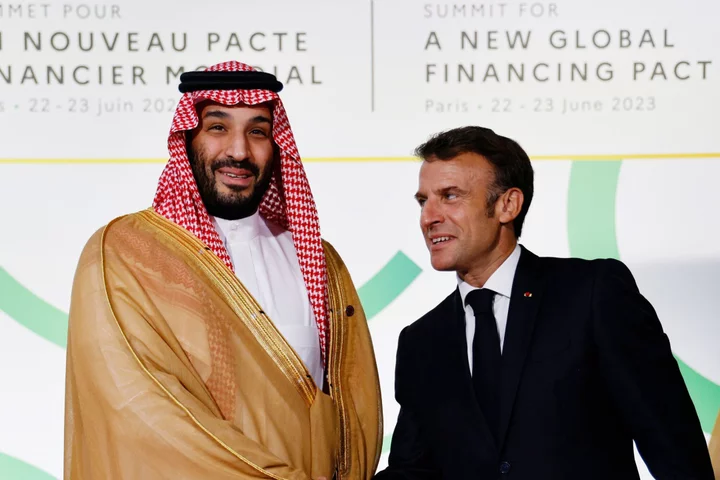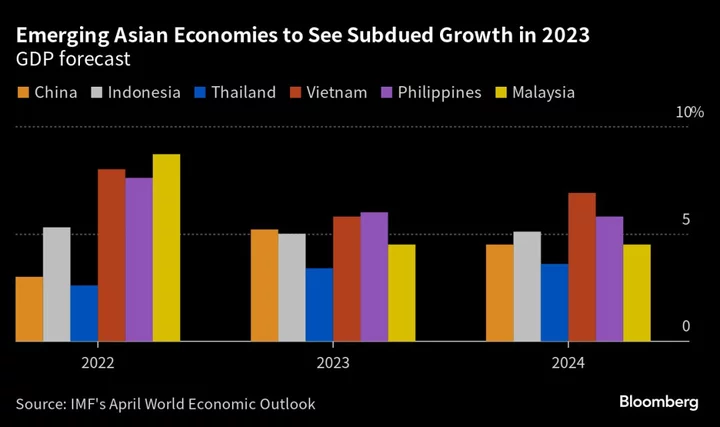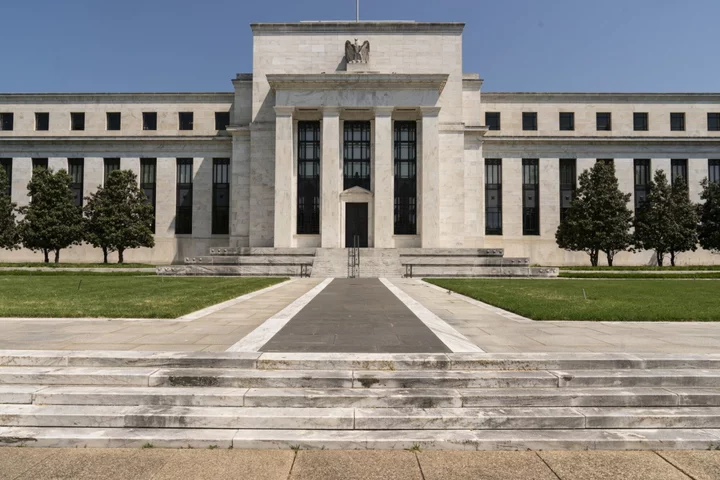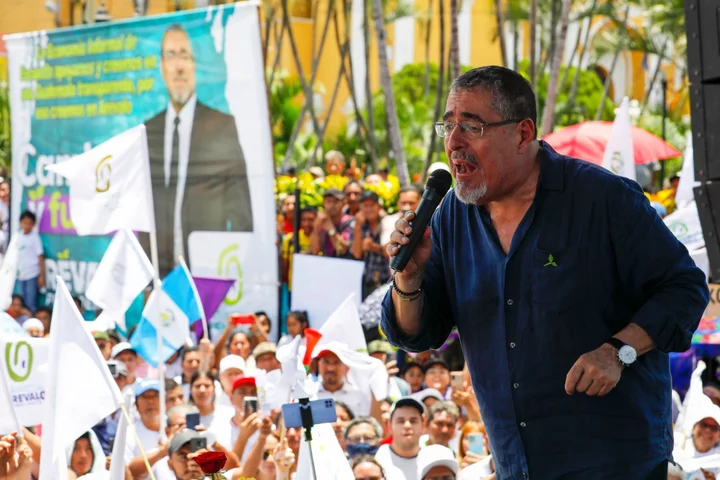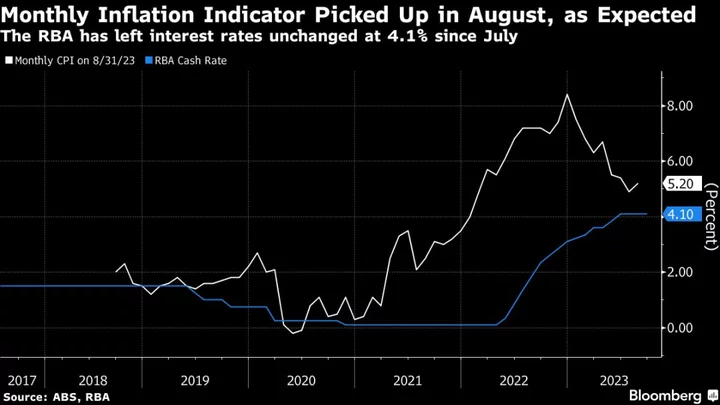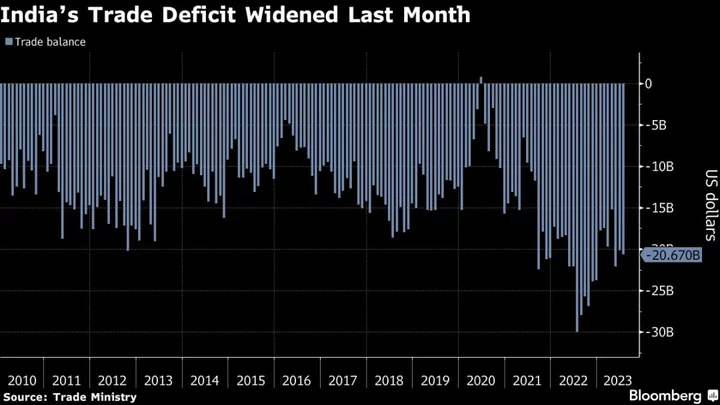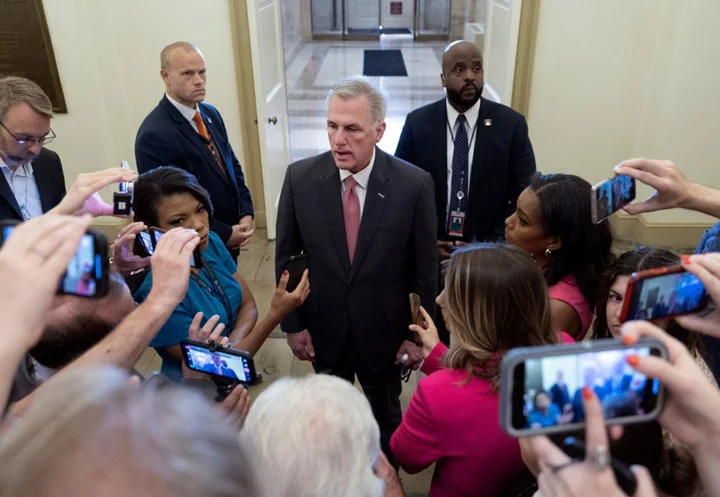The International Monetary Fund confirmed rich countries have channeled $100 billion to finance lending for the world’s poorest economies, while Senegal announced $2.7 billion of energy-transition support and Zambia was set to clinch a debt restructuring at a summit in Paris on Thursday.
French President Emmanuel Macron is hosting world leaders including Brazil’s Luiz Inacio Lula da Silva and Cyril Ramaphosa of South Africa, as well as US Treasury Secretary Janet Yellen and the Chinese premier, Li Qiang, to discuss new ways to raise climate financing.
The talks aim to build momentum for an overhaul of the global lending architecture so that multilateral institutions like the World Bank can do more to help developing nations deal with climate change and raise private investment. Bloomberg Philanthropies is one of the official sponsors of the Summit for a New Global Financing Pact.
Key Developments:
France, China Pledge to Expand Trade Ties With Climate Focus
Yellen Sees Urgency in Boosting IMF Poverty-Fighting Arsenal
Unlocking Trillions for Climate in a Plan From a Sinking Island
Melinda French Gates Says World Debt Woes Need Bold Action Now
World Bank Seeks to Boost Climate Financing for Emerging Markets
Ruto Vows to Buy Back Half of Kenya’s $2 Billion Bond This Year
Axa CEO Says Litigation Threats Undermine Insurers’ Energy-Transition Efforts (5:29 p.m.)
Efforts in the insurance sector to work together toward the energy transition are being undermined by threats of litigation, according to Thomas Buberl, chief executive officer of Axa SA.
The industry got together in the Net Zero Insurance Alliance “to define protocols and methods to focus our insurance capacity for the energy transition,” he said. “But we were brutally attacked, and on legal grounds, which prevented us from progressing together.”
Buberl also said Axa is keen to expand its blue bond program. “We’re working a lot” on such products, he said. After doing blue bonds in South America in 2021, Axa wants to do them in Africa.
Citigroup’s Collins Laments Scant Progress on Climate Financing (4.17 p.m.)
Jay Collins, vice chairman of Citigroup Inc.’s banking, capital markets and advisory division, voiced frustration that little progress has been made on climate financing in the past decade and a half.
“I’m embarrassed to say that 70%-80% of what I’m saying today I said 15 years ago,” he said at the summit. “We keep talking about the same themes. We know the solutions, but are not acting enough.”
Collins said it’s clear the “private sector has to be at the table” to increase private finance for climate mitigation in developing countries. “We need to supercharge the tools that mitigate risk for the private sector to crowd them in,” he said. “We have to look again at the tools and products of all multilateral development banks to say: ‘Are they fit for purpose to take this risk?’”
Senegal Gets $2.7 Billion G-7 Funding for Just Energy Transition (3:20 p.m.)
Senegal has secured a financing package from Group-of-Seven countries worth $2.7 billion to support its transition to clean energy, President Macky Sall said at the summit.
The so-called Just Energy Transition Partnership is modeled after one South Africa agreed with the US, European Union, UK, France, Germany and several institutions to access $8.5 billion, mainly in the form of loans.
A JETP is also being considered with Mongolia, according to Catherine Colonna, French minister for foreign affairs.
IMF Head Congratulates Zambia Over Debt Agreement (2:50 p.m.)
Kristalina Georgieva, managing director of the International Monetary Fund, congratulated Zambia over a debt agreement that she indicated would be announced later in the day.
“Today we will talk about Zambia, which I think is a great case of celebration because it makes debt restructuring agile and effective, and I want to recognize — well, tonight we will recognize everybody — to my dear brother, the president of Zambia, congratulations for you,” she said during a roundtable discussion. “I am very hopeful we’d get the wisdom when a country asks for debt restructuring to have debt standstill — you don’t service your debt.”
Georgieva added that rich countries have finally delivered on a pledge to channel $100 billion of IMF resources to finance lending for the world’s poorest economies. That goal involves countries lending reserve assets known as Special Drawing Rights back to the IMF’s Resilience and Sustainability Trust and the Poverty Reduction and Growth Trust.
Ramaphosa Says Energy Transition Must Be Flexible (1:41 p.m.)
Plans to aid countries with the transition to clean energy must take into account prevailing socio-economic conditions and help resolve the challenges of unemployment, poverty and inequality, South African President Cyril Ramaphosa said.
Pretoria is implementing a so-called Just Energy Transition Plan to reduce its use of coal, and the UK, US, France, Germany and the European Union have backed it with $8.5 billion of loans and grants. This has been seen as a blueprint for other coal-dependent nations to lower their emissions.
“It needs to be a flexible kind of journey,” Ramaphosa said. “Ninety percent of our energy is generated out of fossil fuels, and right now the country is going through a major energy challenge because our energy generation is way below the needs of the country at the moment. So we’ve said that as we transit, as we implement this JETP, we need to take into account that some of our fossil-fuel power stations will need to remain in existence.”
EU to Support Emerging Economies Via Green Bonds, Carbon Markets (1:03 p.m.)
European Commission President Ursula von der Leyen laid out how the bloc plans to help developing countries scale up climate finance using its expertise in green bonds and carbon markets.
She said the EU would commit €1 billion ($1.1 billion) alongside the European Investment Bank and similar institutions in member states to help give private investors certainty when putting their money in riskier countries. That in turn could attract as much as €20 billion of sustainable investment, she said on a panel at the summit.
Von der Leyen also touted the success of the EU’s emissions trading system, which she said had brought in €142 billion in revenue since its inauguration in 2005, while also cutting emissions by 35%. The world needs to look at making such a market global as only 4% of the world’s emissions are currently covered, she added.
“The initiative I wanted to propose is that we look at global carbon pricing,” she said on a panel at the summit. “That could of course generate much, much more funding that could then go into the climate finance that we need so badly.”
Lula Says Brazil Has Moral Authority to Discuss Climate Change (12:50 p.m.)
President Luiz Inacio Lula da Silva said Brazil, home to the world’s largest rainforest, has “moral authority” to talk about climate change and accused developed nations of having destroyed their own forests over past centuries.
He urged “those who defend the Amazon but don’t know the Amazon” to visit the region and understand that protecting the rainforest shouldn’t prevent 28 million people who live there from having better economic conditions.
The comments were made to reporters in Rome shortly before he set off for Paris. Asked about a trade agreement between the European Union and the Mercosur countries of South America, Lula praised France for defending its farmers but stressed that other countries also have the right to do so.
Le Maire Sees Debt-Restructuring Progress for Zambia, Sri Lanka (12:15 p.m.)
French Finance Minister Bruno Le Maire said there may be a “positive outcome” in negotiations to restructure Zambia and Sri Lanka’s debt.
“We are moving in the right direction as far as debt restructuring is concerned, we want to move faster,” he told Bloomberg Television’s Francine Lacqua at the summit. “We could have a positive outcome as far as the debt of Zambia and Sri Lanka is concerned.”
He said it’s good news that key creditor China’s premier, Li Qiang, is in Paris talking with heads of state and US Treasury Secretary Janet Yellen.
Le Maire added: “We don’t want the poorest countries in the world to be confronted with a choice between fighting against extreme poverty and fighting against climate change.”
Ethiopia’s Abiy Calls for Africa Financing Boost (11:44 a.m.)
Ethiopian Prime Minister Abiy Ahmed said grants and concessional financing for African countries that are simultaneously contending with climate change, high debt levels, instability and elevated living costs have to be increased.
“What makes it unique in Africa is the magnitude of the crises, as well as the interconnectivity of the crises,” he said. “Today, a daily meal for many Africans is the biggest issue. Private and public debt has reached new heights.”
Abiy also called for financing of low-carbon investments such as wind, solar and geothermal energy projects, and for the reform of the World Bank and other multilateral development institutions to ensure they direct more capital toward low-income countries.
World Bank to Offer Debt-Repayment Pause for Crisis-Hit Nations (11:23 a.m.)
The newly appointed president of the World Bank said the development lender will allow countries hit by catastrophes to pause debt repayments.
The move is part of plans to significantly expand its toolkit to help nations prepare for and respond to crises, Ajay Banga said on a panel at the summit. This will also include providing new types of insurance for development projects and allowing countries to redirect a portion of their funds to tackle emergencies.
The World Bank will “offer a pause in debt repayments so countries can focus on what matters to their leaders when a crisis hits and stop worrying about the bill that’s going to come with that crisis,” he said.
Banga added: “We’re looking to embed catastrophe insurance in our lending products – with the intent to cover insurance premiums and interest through the generosity of others. This would ultimately give countries recovery resources without adding to their debt.”
Barbados’s Leader Says the Global Order Is Starting to Change (10:34 a.m.)
Mia Mottley, prime minister of Barbados and co-host of the summit along with Macron, said that change is starting to happen as she described the extreme weather threatening her country. “We come to Paris with a heavy heart but hope,” Mottley said.
She has championed the Bridgetown Agenda, named after her island country’s capital, which proposes currency-exchange guarantees, disaster-linked debt relief clauses, and stretching multilateral development Bank reserves for much greater lending
It’s a “comprehensive and very ambitious” plan, she said, to rewire global capitalism to tackle climate change and enlist the support of multinational corporations.
“We do not ask for the bankruptcy of private companies,” she added. “But we do ask everybody to share the burden so that we can share the bounty.”
Macron Appeals to Private Investors to Step Up (10:03 a.m.)
The French president called for a massive increase in private-sector funding both to fight poverty and address climate-change issues in developing countries in his speech opening the summit.
To facilitate that shift, he repeated his call for changes in the international financial architecture to remove part of the risk faced by financial institutions and to put in place guarantee mechanisms that would allow them to go into locations where they currently won’t.
“Without the private sector, sovereign funds and philanthropic institutions, we won’t meet this challenge,” Macron said.
Yellen Says It’s Critical to Keep Lines Open to China (9:10 a.m.)
Treasury Secretary Janet Yellen said she and President Joe Biden both believe it’s critical to maintain communication to manage the US’s relationship with China and to “clear up misperceptions, miscalculations.”
“We need to work together where possible but we have disagreements and we are also forthright in recognizing where we do have disagreements,” she said at a press conference in Paris. Yellen was asked whether she agreed with an off-the-cuff remark by Biden this week likening Xi Jinping to a “dictator.”
“I’m certainly pleased to see China participating in this summit,” she added. “I believe it’s important, as President Biden does, that the world’s two largest economies are united in working multilaterally and together in addressing global challenges.”
Le Maire Says Reform Could Raise ‘Hundreds of Billions’ (9:07 a.m.)
France will push delegates to consider the feasibility of new taxes on maritime transport, how to improve debt restructuring and bolster the firepower of international institutions, Finance Minister Bruno Le Maire said on RFI radio ahead of the summit.
The French minister said multilateral development banks could raise around $200 billion to tackle climate change in the coming months by leveraging their balance sheets and taking more risk. He also said countries “can and will” meet their pledge to recycle $100 billion of the International Monetary Fund’s Special Drawing Rights to fund lending to poor countries.
“All together we are looking at hundreds of billions of dollars,” Le Maire said.
--With assistance from Amogelang Mbatha, Samy Adghirni, John Ainger, Natasha White, Yinka Ibukun, Ania Nussbaum, Alan Katz and Simon Marks.
Author: William Horobin, Akshat Rathi and Viktoria Dendrinou

